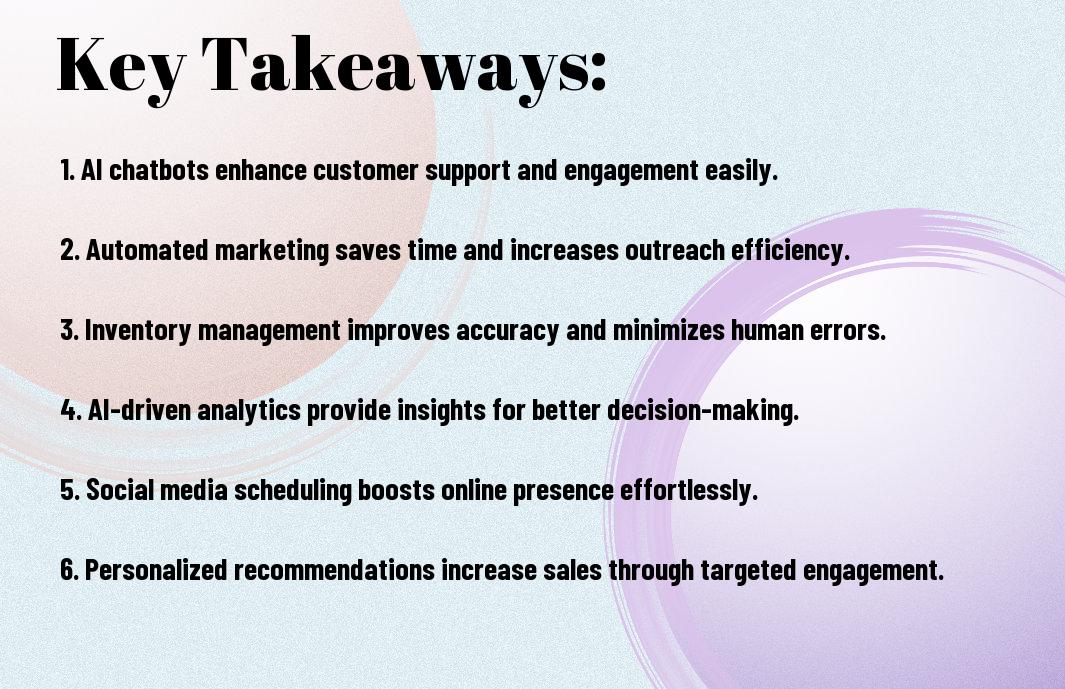Understanding AI Automation
Before entering into the myriad ways AI can bolster your small business, it’s important to grasp the concept of AI automation. This technology leverages algorithms and machine learning to perform tasks that traditionally require human intervention. By understanding how AI can streamline operations, you can position your business for greater efficiency and productivity.
Definition and Benefits
Beside improving efficiency, AI automation encompasses various technologies that can handle repetitive tasks, enabling you to focus on strategic initiatives. The benefits include reduced operational costs, enhanced accuracy, and improved customer engagement. By implementing these solutions, your business can thrive in a competitive landscape.
Role in Business Operations
After embracing AI automation, your business operations can transform significantly. The integration of AI tools allows for the optimization of workflows, reduction of errors, and timely decision-making. These innovations enable you to allocate resources more effectively, thereby enhancing overall productivity.
A robust implementation of AI can significantly influence various facets of your business operations. From automating customer service with chatbots to streamlining inventory management, you can experience a smoother flow of daily tasks. Moreover, by analyzing data in real-time, AI equips you with actionable insights to adapt quickly to market changes, ensuring that your business remains agile and responsive.
AI Tools for Small Businesses
Some small businesses harness the power of AI tools to streamline operations and enhance productivity. These technologies can help you manage tasks efficiently, freeing up your time to focus on growth and innovation. From automating customer interactions to optimizing marketing strategies, AI empowers your business to thrive in today’s competitive landscape.
Customer Service Automation
Among the most beneficial uses of AI in small business is customer service automation. Many businesses find that chatbots and automated response systems can handle customer inquiries around the clock. This not only enhances customer satisfaction but also allows you to allocate resources more effectively, focusing on more complex customer interactions.
Marketing and Sales Automation
With marketing and sales automation tools, you can efficiently reach out to potential customers and nurture leads. These solutions can streamline your outreach efforts, analyze customer data, and personalize messaging, enabling you to connect with your audience effectively.
Small businesses can significantly benefit from integrating marketing and sales automation into their strategies. By leveraging these tools, you can create targeted campaigns, track customer behavior, and measure performance in real time. This data-driven approach not only saves you time and effort but also helps improve conversion rates, allowing your business to grow sustainably.
Streamlining Operations with AI
Many small businesses are adopting AI technologies to enhance operational efficiency, allowing you to focus on growth and customer satisfaction. By automating routine tasks, AI minimizes human error and speeds up processes, enabling your business to respond swiftly to changes in the market. Additionally, these technologies can provide insights into your operations, allowing for better decision-making and resource allocation.
Inventory Management Solutions
Along with the rise of e-commerce, AI-driven inventory management solutions help you keep track of stock levels, predict demand, and reduce excess inventory. These systems analyze consumer patterns and trends, ensuring you maintain optimal stock levels while minimizing wastage. By having real-time visibility into your inventory, you can streamline supply chains and improve customer satisfaction by preventing stockouts or overstock situations.
Financial Management Applications
With AI-powered financial management applications, you can manage your finances more effectively, reducing administrative burdens and enhancing accuracy. These tools automate invoicing, expense tracking, and payroll processes, which helps you save time and prevents costly mistakes.
Hence, these applications can analyze financial data, offering insights into cash flow, budgeting, and forecasting. By utilizing AI, you gain real-time visibility into your financial health, empowering you to make informed decisions. Embracing these technologies means you can focus on growing your business while ensuring your financial processes operate smoothly.
Enhancing Customer Experience
To stay competitive in today’s market, small businesses must focus on enhancing customer experience through AI automation. By leveraging technology, you can streamline operations, understand customer preferences, and provide seamless interactions, all of which can lead to increased satisfaction and loyalty. Investing in these enhancements not only elevates your brand but also enables you to cater to the evolving needs of your clientele effectively.
Personalized Recommendations
Personalized recommendations play a significant role in enhancing customer satisfaction. By analyzing your customers’ behavior and preferences, AI algorithms can suggest products or services that align perfectly with their interests. This tailored approach not only simplifies the buying process but also makes your customers feel valued, fostering a deeper connection with your brand.
Chatbots and Virtual Assistants
About chatbots and virtual assistants, these AI-driven tools provide instant support to your customers, ensuring their queries are addressed promptly. Available 24/7, they handle common inquiries, allowing you to focus on more complex issues while enhancing your customers’ experiences.
With chatbots and virtual assistants, you can automate responses to frequently asked questions, manage bookings, and assist with order tracking. This not only reduces wait times but also significantly improves customer engagement. By implementing these AI solutions, you can provide your customers with efficient service that meets their needs at any hour, reinforcing their loyalty to your brand.
Case Studies: Success Stories
Keep exploring how small businesses leverage AI automation to enhance their operations and drive growth. Here are a few impressive case studies that highlight remarkable results:
- A local coffee shop increased sales by 30% after implementing an AI-driven inventory management system.
- A boutique clothing store saw a 25% reduction in customer service response time using chatbots for inquiries.
- An online pet supply retailer achieved a 40% boost in customer retention through personalized email marketing powered by AI.
- A regional landscaping company enhanced productivity by 50% by utilizing AI scheduling software for crew management.
Retail Sector Innovations
After adopting AI solutions, retailers have transformed their business landscapes dramatically. For example, stores using AI-driven analytics have created targeted marketing strategies, resulting in significant increases in foot traffic and online sales. Automation tools enable retailers to forecast demand more effectively, optimizing inventory levels and enhancing customer satisfaction.
Service Industry Transformations
Stories of innovation abound within the service industry, where AI tools are reshaping customer interactions. Businesses are harnessing AI for service automation, improving both efficiency and client satisfaction.
Another noteworthy change in the service sector involves the introduction of virtual assistants and AI chatbots that provide 24/7 customer support. Many companies have recorded significant improvements in client engagement, leading to increased trust and loyalty. For instance, an accounting firm reported a 60% improvement in response rates to client inquiries since integrating a virtual assistant, showcasing the ability of AI automation to profoundly impact service delivery.
Challenges and Considerations
Not all small businesses thrive seamlessly with AI automation. While technology can offer numerous benefits, challenges such as integration issues, data privacy concerns, and cost implications could hinder your progress. It’s important to evaluate these challenges critically to ensure a smooth transition into automation. Assessing your business needs and being aware of potential hurdles will better prepare you for successful implementation.
Integration Issues
Before implementing AI tools, you’ll need to consider how well they can integrate with your existing systems. A lack of compatibility can lead to disruptions in workflow and productivity. Ensuring your current technology stack can support new AI solutions will be crucial for maximizing efficiency and achieving the desired outcomes.
Data Privacy Concerns
On the topic of data, it’s vital to recognize the importance of data privacy when employing AI tools. Protecting your customers’ information should be a top priority, as any breach can harm your reputation and lead to legal repercussions.
It’s crucial to have robust measures in place for data protection while utilizing AI solutions. This includes understanding how the data is collected, stored, and analyzed by AI systems. Implementing strong security protocols and being transparent about data usage with your customers can help mitigate risks. Staying updated on regulations, such as GDPR or CCPA, and ensuring compliance can further safeguard your business and build trust with your clients.
Final Words
The integration of AI automation into your small business can drive efficiency, enhance customer experiences, and ultimately boost your bottom line. By leveraging technologies such as chatbots, automated email marketing, and inventory management systems, you can focus more on strategic growth while technology handles repetitive tasks. Embracing these innovations not only streamlines your operations but also positions you ahead of competitors who may hesitate to adapt. Your investment in AI is a step towards a more sustainable and successful business model.
FAQ
Q: What are some examples of AI automation that small businesses can implement?
A: Small businesses can leverage AI automation in various ways to improve efficiency and productivity. Examples include chatbots for customer service, which can handle inquiries 24/7, freeing up staff for more complex tasks. Another example is using AI for inventory management, which can predict stock levels based on sales patterns, reducing overstock and stockouts. Additionally, AI-powered marketing tools can analyze customer data and automate personalized email campaigns, enhancing engagement and conversion rates.
Q: How can AI automation help small businesses save money?
A: Implementing AI automation can lead to significant cost savings for small businesses. By automating routine tasks, businesses can reduce labor costs and minimize human errors, which often lead to costly mistakes. For instance, automating invoicing and payroll processes can save time and reduce the need for extensive accounting resources. Moreover, AI-driven analytics can help businesses make data-informed decisions, optimizing spending on marketing and operations to improve overall profitability.
Q: Are there any challenges small businesses may face when adopting AI automation?
A: Yes, while AI automation presents many benefits, small businesses may encounter some challenges during implementation. One of the primary issues is the initial investment required for technology and training staff. Small businesses might also face difficulties in integrating AI solutions with existing systems. Furthermore, there may be a learning curve as employees adapt to using new tools. Overcoming these challenges often requires careful planning, budgeting, and sometimes seeking external expertise to ensure a smooth transition.
Want to stay ahead of the competition? Schedule your call now and learn how our AI automation services can future-proof your business!
CLICK Here To Schedule Your Call!!



